How to replace a flipper mullion on a French-door refrigerator
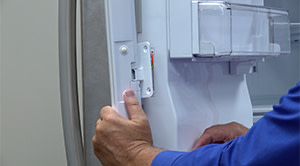
This DIY repair guide gives step-by-step instructions for replacing a flipper mullion on a French-door refrigerator. The flipper mullion creates an airtight seal between the closed refrigerator doors. A small heater inside the flipper mullion prevents condensation from forming on the mullion. Replace the flipper mullion if it's damaged or when its heater quits working, causing the mullion to sweat.
Follow the steps in this repair guide to replace the flipper mullion using a manufacturer-approved replacement part.
This repair procedure works for the replacing the flipper mullion in many Kenmore, LG, Samsung, Frigidaire and Whirlpool French-door refrigerators.
How to replace the flipper mullion on a French-door refrigerator.
Instructions
- 01.
Disconnect power
Shut off the house circuit breaker for the refrigerator or carefully pull the refrigerator forward and unplug the refrigerator.
The refrigerator will be without power for about 15 minutes, which shouldn't affect most refrigerated or frozen foods. However, you may want to move highly perishable food to a cooler.
- 02.
Remove the flipper mullion
Using a Phillips screwdriver, remove the screws from the center flipper mullion bracket. Slightly lift the flipper mullion and release it from its top and bottom brackets. Then, unplug the flipper mullion wire harness.
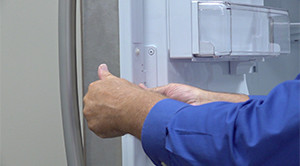
PHOTO: Remove flipper mullion screws.
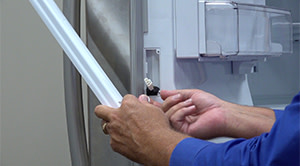
PHOTO: Unplug the flipper mullion wire harness.
- 03.
Install the new flipper mullion
Hold the flipper mullion near the door and connect the flipper mullion wire harness. Attach the flipper mullion to the top and bottom mounting brackets. Align the center bracket mounting holes and install the mounting screws.
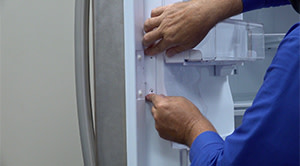
PHOTO: Attach the new flipper mullion.
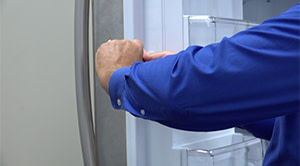
PHOTO: Install the flipper mullion screws.
- 04.
Restore electrical power
Plug the power cord into the wall outlet or reset the house circuit breaker for the refrigerator. Move the refrigerator back into the cabinet if necessary.
Most common symptoms to help you fix your refrigerators
Choose a symptom to see related refrigerator repairs.
Main causes: blocked vents, defrost system problems, evaporator fan failure, dirty condenser coils, bad sensors, condens…
Main causes: damaged door seal, faulty defrost sensor or bi-metal thermostat, broken defrost heater, bad defrost timer o…
Main causes: jammed ice cubes, broken ice maker assembly, dirty water filter, kinked water line, bad water valve, freeze…
Main causes: control board or cold control failure, broken compressor start relay, compressor motor failure, defrost tim…
Main causes: leaky door gasket, defrost system failure, evaporator fan not running, dirty condenser coils, condenser fan…
Main causes: blocked air vents, compressor problems, condenser or evaporator fan not working, control system failure, se…
Main causes: water valve leaking, frozen or broken defrost drain tube, overflowing drain pan, cracked water system tubin…
Things to do: clean condenser coils, replace the water filter, clean the interior, adjust doors to prevent air leaks, cl…
Most common repair guides to help fix your refrigerators
These step-by-step repair guides will help you safely fix what’s broken on your refrigerator.
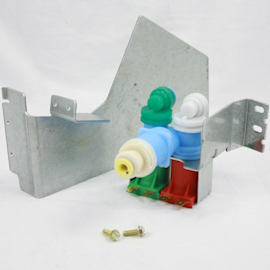
How to replace a refrigerator water valve
Replace the water valve that feeds water to the ice maker and water dispenser if it no longer controls the flow of water…

How to clean refrigerator condenser coils
Help your refrigerator run more efficiently by cleaning the condenser coils. It's easy and takes just a few minutes.…
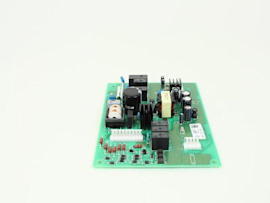
How to replace a refrigerator temperature control board
If the temperature in your refrigerator doesn't match the temperature you set, the problem could be the temperature cont…
Effective articles & videos to help repair your refrigerators
Use the advice and tips in these articles and videos to get the most out of your refrigerator.
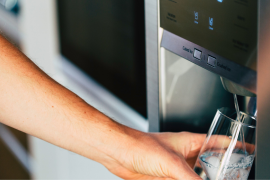
No matter what style Maytag refrigerator you have, we can walk you through replacing the water filter.…

Learn about all the convenient features on our Sears PartsDirect website that make your parts purchases easier.…
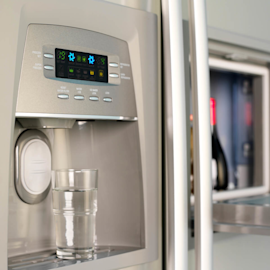
If your refrigerator's ice maker isn't producing as much ice as it should, or water is flowing poorly from the dispenser…
